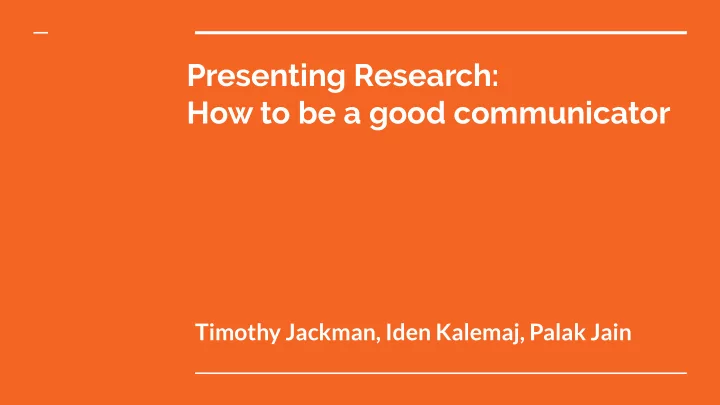

Presenting Research: How to be a good communicator Timothy Jackman, Iden Kalemaj, Palak Jain
Outline ● Preparing for your talk Visual aids ● ● Public speaking tips
1. Preparing: it’s all about the right frame of mind
Mismatched fears I will be too repetitive and bore the ● audience I will be explaining basic stuff and bore ● the audience They did not give a definition for this term ● so I’m probably stupid for not knowing and everybody else knows
Remedies for mismatched fears 1. Define EVERYTHING!! - Question: Do I really need this extra concept in my talk? - Example: “no bicycles property”. 2. Tell them what you are going to say, say it, tell them what you said.
Too eager? I will tell them about everything that is cool about my paper vs. I will tell them enough that they are motivated to read my paper
How to motivate - The 80 % People understand the problem at hand REALLY well ● People understand why the problem is important ● People understand what there has been done on this problem ● People understand the really COOL stuff that other people ● (probably not you) have done People understand what you did EXACTLY ●
How to motivate - The 20 % ● Main challenges of your work Are there good examples for this challenge? ○ ● Surprising results Are there good examples for the surprise? ○ ● Technicalities WOW, somehow you still have time for this! ○ ○ Use it well: lots of structure, clarity, reminders, simplify!
How to motivate - Over the top Intuitions for everything you say ● Some conclusion where everything comes magically together ● Open problems sound really interesting ●
2. Visual Aids Slides ➔ Boardwork ➔ Something I’m missing? ➔
Before we begin...
Don’t put too much text in your slides. Don’t let your message and your ability to tell a story get derailed by slides that are unnecessarily complicated and busy. Nothing in your slide should be superfluous, ever. Your slides should have plenty of “white space” or “negative space.” Do not feel compelled to fill empty areas on your slide with your logo or other unnecessary graphics or text boxes that do not contribute to better understanding. The less clutter you have on your slide, the more powerful your visual message will become.
Keep it simple!
Serif fonts are usually not a good idea on slides Nor are fancy fonts Neither is our favorite
Keep your formatting consistent!(unless..)
Board Work 1. Layout Remember what needs to stay on the board 2. Silence Writing silently can lose the audience’s attention 3. Take advantage of the medium Remember that you can erase board work!
3. Time to Present You’ve prepared and now it’s time to present! But I hate public speaking...
Public Speaking ● Fear of Public Speaking ○ Estimated to affects up to 75% of People ○ Fake it till you make it ● Body Language ○ Give off “Expert”-energy ○ “I want to be here” ○ Stand still, not fidgeting ● Practice, Practice, Practice ○ But don’t overly script ○ Don’t wing it
Public Speaking ● Tone, Volume, Speed ○ Not too quiet, not too loud ○ Not too quick, not too slow ○ Vary tone, speed, volume for effect ● Filler Words ○ Ummm, Ahhh, Like, and other idiosyncrasies ● Eye Contact ○ Find the perfect balance ● Anything else?
Giving your Conference Talk ● Do ○ Consider your audience ○ Be prepared for things to go wrong ○ Practice (both presenting and questions) ● Don’t ○ Go over your allotted time ○ Fight with the moderator/session chair ○ Make stuff up ● Anything else?
Other “Talks” You May Give About Your Research or Other People’s Research ● Seminars ● Reading Groups ● Interviews ● Informally to your colleagues/friends ● Anything else you can think of? ● Regardless, remember: ○ Know your audience ○ Strive for Good Public Speaking
Thank you!
Recommend
More recommend